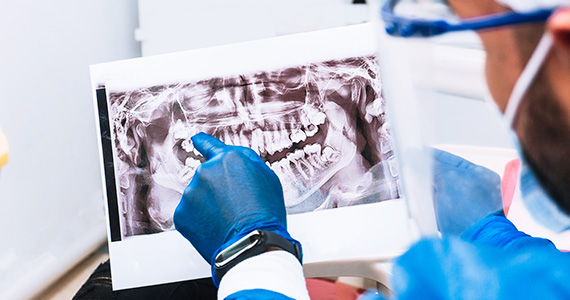Wisdom Teeth
Should your wisdom teeth be extracted?

What are wisdom teeth?
Wisdom teeth, also known as third molars, erupt at the back corners of the mouth typically between the ages of 17 and 25. Half of all people have at least one wisdom tooth. However, others do not develop any. This is normal.
How wisdom teeth evolved
Scientists believe wisdom teeth were needed by early people to help them chew nuts, roots, rough plants and seeds that made up the bulk of their diet. As other teeth broke, wore or fell out, the wisdom teeth helped them to continue chewing tough food.
Over time, people adapted to the environment and started cooking food (which made it softer). Wisdom teeth became less necessary. As humans continued to evolve, their brains started growing and taking up more space, and jaws started to get smaller. Nowadays, many people find that there just isn't enough space in their jaws for wisdom teeth to come all the way in.
Signs of wisdom teeth coming in
Tooth development occurs in an organized manner over many years. Wisdom teeth begin forming around age 10 and are the last set of molars to come in.
For many people, the appearance of white spots on the gums behind the last tooth is the first sign of a wisdom tooth coming in.
If a wisdom tooth becomes infected or causes other problems, you may experience symptoms such as:
- Bad breath or taste
- Difficulty opening your mouth
- Jaw pain
- Red or swollen gums behind the last molars
- Swelling around your jaw
- Tenderness or general discomfort in the back of your mouth
See your dentist if you have any of the above symptoms. They could be a sign that treatment is necessary. Your dentist will examine your mouth and take an X-ray before talking with you about the best course of treatment.
Removal of wisdom teeth
The presence of wisdom teeth alone does not mean they need to be removed. They may not require treatment if they are healthy, fully grown in, positioned correctly and you are able to clean them well.
When a person does not have enough room, their wisdom teeth may grow in crooked, become impacted or be blocked by other teeth. If you experience symptoms, your dentist may recommend extraction(s).
There are four different types of impacted wisdom teeth:
- Soft tissue - The biting surface of the tooth is covered by soft tissue.
- Partial bony - Part of the crown of the tooth is covered by bone.
- Complete bony - Most or all of the crown of the tooth is covered by bone.
- Complete bony with unusual surgical complications - Most or all of the crown of the tooth is covered by bone, and it is difficult to remove because of other existing conditions (example: proximity to the nerve).
Many people retain impacted wisdom teeth for a lifetime with no issues. However, partially impacted wisdom teeth typically require extraction. This is because they are difficult to clean and prone to cavities and infection. It is also common for a dentist to recommend extraction when wisdom teeth display symptoms, when pathology such as a cyst, tumor or infection is present or when a complication is anticipated.
Talk to your dentist if you have concerns about your wisdom teeth. They will advise you of your treatment options, risks and benefits and if and when you should remove them. Treatment considerations include your age, the presence of decay or gum disease, whether cysts or tumors are present and whether there has been recurrent infection around the tooth (or teeth) in question. In some cases, extraction may be suggested before you even experience symptoms if it looks like issues will occur in the near future.
Note: The information in this article is not meant to replace the advice of your dentist or another licensed healthcare professional. Talk to your dentist for any specific dental advice.
Sources: https://www.mouthhealthy.org/all-topics-a-z/wisdom-teeth https://www.mayoclinic.org/tests-procedures/wisdom-tooth-extraction/about/pac-20395268






